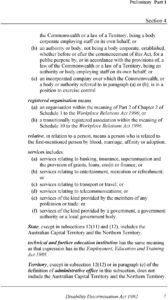Disability Discrimination Act 1992
The disability discrimination Act 1992 prohibits many types of discrimination against people with disabilities. While these types of discrimination are illegal, certain circumstances may be exempt from the Act. Examples include access to employment, the use of discriminatory questions on employment application forms, and the dismissal of employees. In some cases, the Act even covers the actions of licensing bodies and trade unions. Read on to learn more about what is banned under the Act.
The Act prohibits discrimination against people with disabilities in the workplace. This discrimination occurs when the person treating the person with disability is less favourably than someone without a disability. The discrimination is unlawful if the person is treated less favourably because the person with a disability is unable to make reasonable adjustments. This act also prohibits employers from refusing employment to a disabled person because of their disability.
Among the many areas covered by the act are admission to education and access to facilities and services. These laws prohibit employers from discriminating against people with disabilities in employment applications, recruitment procedures, or other decisions. They also prohibit discrimination in vocational training, financial assistance, or access to vehicles and premises. This legislation is also applicable to the provision of goods and services to the public. The law covers many areas and is aimed at making life easier for people with disabilities.
A fuller definition of disability will prohibit discrimination based on a person’s disability. Special rules would apply to people with severe disfigurements, those with fluctuating severity, and people with previous disabilities. Moreover, there are free general advice services for employers and service providers. They can help you find ways to protect yourself from discrimination, and make sure you are fully aware of your rights. So, if you are concerned about discrimination, you can contact the Equality Commission.

What is Banned Under the Disability Discrimination Act 1992?
The DDA has been relatively effective in addressing the problem of disability discrimination, but there is still a long way to go. The challenge now shifts from physical barriers to attitudinal barriers. In particular, employment discrimination is a key barrier to full participation in society. This Act covers the rights of people with disabilities and those who are accompanied by an assistant or trained animal. In addition, the Act covers employers’ responsibility to provide reasonable accommodations to people with disabilities.
Mandatory standards may also impact entire sectors. If all organisations within a sector have to meet the same standards, the cost impact of the regulations may be prohibitive for some businesses. Such standards can prevent competition, as they restrict the ability to offer innovative services. However, these regulations do not prohibit the use of a disability-specific standard. However, they may impose additional costs on consumers and businesses in the same industry.
The ADA was passed into law on July 26, 1990. The act prohibits discrimination against people with disabilities in employment, government, and community life. These laws are intended to ensure equal rights for people with disabilities and protect their dignity. Despite the many benefits of ADA, the law is often the subject of lawsuits. While the ADAAA has helped protect the rights of disabled people, many have had to face discrimination and are pursuing justice.